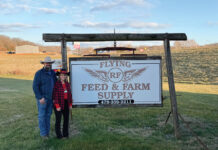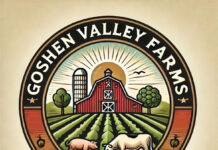White River Fertilizer Supply
Owners: Tracy Argo (pictured) and Bruce Johnson
Location: Summers, Ark.
What they do: Tracy and Bruce use a machine – which was originally designed to bale trash in Europe – to bale chicken litter from the Illinois Water Shed. The litter is compressed into 4×4 bales, covered with plastic wrap and shipped to Arkansas and Oklahoma croplands to be used as fertilizer.
Company History: Tracy was working on a masonry project moving the historic Cross S Ranch House from near the Red River to a museum in Altus, Okla. While he was there, he met Tom Buchanan who asked him about the possibilities of moving chicken litter to use as fertilizer on cotton fields in Oklahoma.
Tracy, who is always up for a challenge, began researching the possibilities.
“About a month into my research, an extension agent from Washington County told me to contact Dr. H.L. Goodwin at the University of Arkansas about the concept of baling litter,” said Tracy.
There was already a baler located in Lincoln. The baler had run for a mere three hours. However, it had been sitting idle for three years and needed cleaning and a few adjustments before it could be used.
Tracy and Bruce bought the baler and started working. Their first day of production was Oct. 31, 2008.
“The first day we ran about 12 tons through it, now it will run about 240 tons in an eight-hour shift.”
“Within 125 days of being asked about moving chicken litter to Altus, the first bale was delivered.”
Challenges: “For a long time I concentrated on production, I finally got production up. Then I realized we are lacking in sales, so I jumped into sales.”
The company is currently concentrating on educating crop farmers of the benefits of fertilizing with chicken litter. They are making contacts and building their clientele.
In the meantime, they are working with the University of Arkansas, researching various aspects of the project including additional information on soil nutrients and possible variations of the machine.
Vision: “For the farmers we are giving them nutrients cheaper than they can find it anywhere else. For the watersheds, we are helping the environment by getting rid of excess nutrients.”
Why it works: “Baled litter provides a 70 percent uptake of nutrients in one year compared to 50 percent uptake for raw litter. It also provides organic material and micro-nutrients which are very important to rice producers.”
Baled litter is also more economical to ship than raw litter. It can be transported on flatbed vehicles. Once it reaches the desired location, farmers can spread it using a traditional manure spreader.
The Future: “Eventually we hope to co-process bio-solids, which are the solids left over after municipal sewage treatment.
“It will increase the nitrogen content and lower the costs of production. It will also give cities another option. The nutrients are wasted and it costs the city a lot of money.”
Another aspect that will affect the company is the outcome of Oklahoma Attorney General Drew Edmondson’s lawsuit against representatives of poultry companies in Arkansas. Edmondson’s suit accuses the companies of polluting the water by spreading litter in the watershed. If successful, the suit will limit or ban landowners from spreading litter on fields in the watershed.
Company Goal: “We are trying to create markets where there are no markets, trying to help the environment’s water quality issues in water sheds, trying to reduce the input costs for farmers and increase the crop yields at the same time. And make money – of course we have to make money.”
By Sarah Hale






